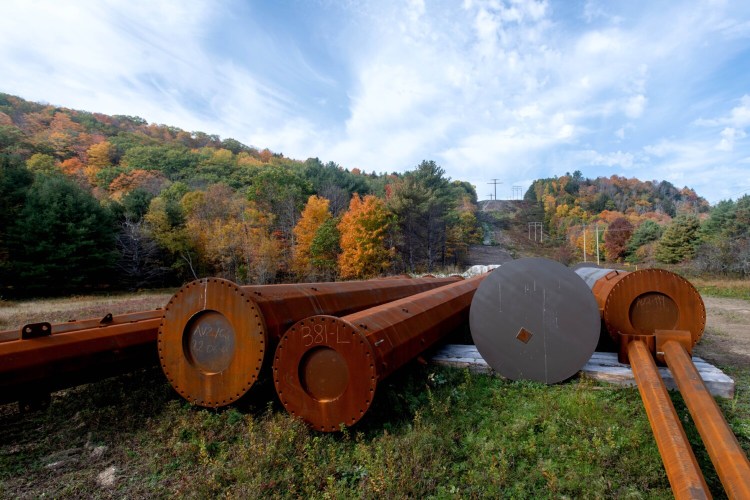A group that helped lead the opposition to a $1 billion electricity transmission line through western Maine asked state officials on Thursday to order an immediate halt to the tree clearing and construction work on the project.
Two days after a referendum to kill the project passed with about 60 percent of the vote, the Natural Resources Council of Maine filed a motion with the state Department of Environmental Protection asking the agency to order the work be stopped.
After the votes were counted, work clearing land along the route of the corridor resumed despite the majority of voters’ rebuke of Central Maine Power Co. and its parent corporation, Avangrid, which had created another company, New England Clean Energy Connect, to build the transmission line.
That company immediately filed a lawsuit in Maine Superior Court on Wednesday challenging the constitutionality of the referendum.
The 145-mile corridor, which has been under construction since January, is designed to carry electricity from Hydro-Quebec in Canada to a connection with the New England power grid in Lewiston.
Most of the power will ultimately go to Massachusetts electric consumers, who are footing the bill for the project.
The NRCM said the stay is needed to avoid “irreparable harm” if construction on the corridor continues. There was no immediate response from state environmental officials.
Neither Melanie Loyzim, commissioner of the DEP, nor Mark Draper, chairman of the Board of Environmental Protection, replied to emailed requests for comment Thursday afternoon.
“On Tuesday, Maine people overwhelmingly voted to terminate the CMP corridor, yet the next day, CMP continued cutting down trees in Western Maine as if nothing happened and then filed a lawsuit to overturn the vote,” said Nick Bennett, an NRCM staff scientist.
Bennett said the state has a responsibility “to defend the meaning of our vote and respect the new law” by suspending CMP’s permit to build the corridor.
But the head of New England Clean Energy Connect, the company formed to construct the corridor, said it plans to keep working while its lawsuit winds through the courts.
“We filed a preliminary injunction (against the referendum) … so we can keep hundreds of workers on the job and ensure that essential construction on this clean energy project is not disrupted,” said Thorn Dickinson, president and chief executive officer of NECEC.
In its application for an order from the department to halt NECEC’s work, the NRCM noted that either the commissioner or the board can order a stay and lift the permits it has issued.
The motion, written by Drummond Woodsum attorney James T. Kilbreth, conceded that NECEC may argue that the rules adopted by the referendum won’t take effect until early January, but said it would be irresponsible for the state to allow the clearing and construction to continue on a project that is barred by the referendum.
“It would be more than a dereliction of duty to allow continued destruction of the North Maine Woods for another two months until the law becomes effective,” Kilbreth wrote.
Tuesday’s vote was the culmination of a months-long political battle to win over Maine voters on the electric corridor, which has been in the works for more than seven years.
The transmission line’s route is mostly on land owned or controlled by CMP and two-thirds follows existing CMP power line corridors, although some of the existing corridors would be widened to carry an additional set of polls.
And about a third of the route is through undeveloped commercial forest between the Forks and the Quebec border in an area valued for its wildlife, biodiversity and recreational uses.
Proponents of the referendum argued that Mainers should protect the Maine woods against a project that would primarily benefit residents of another state. The proposed transmission line has a capacity of 1,200 megawatts, enough electricity for about 1 million homes.
But CMP, NECEC, Avangrid and Hydro-Quebec countered by saying that the referendum was an overreach and, because it called for review of approvals going back seven years, represented an unfair retroactive application of laws.
Now that the referendum was approved, the contest over the corridor will switch venues, to the courtrooms and the state and federal agencies that provided permits for the project. The last, a presidential permit from the U.S. Department of Energy, was granted in January, after which NECEC started work on the corridor.
Send questions/comments to the editors.




Success. Please wait for the page to reload. If the page does not reload within 5 seconds, please refresh the page.
Enter your email and password to access comments.
Hi, to comment on stories you must . This profile is in addition to your subscription and website login.
Already have a commenting profile? .
Invalid username/password.
Please check your email to confirm and complete your registration.
Only subscribers are eligible to post comments. Please subscribe or login first for digital access. Here’s why.
Use the form below to reset your password. When you've submitted your account email, we will send an email with a reset code.